Puno (Peru) to Tilcara (Argentina)
Yesterday was a long day, and last night in Puno it got down to minus 6 degrees Celcius, so we have a bit of a sleep in before venturing out for a bacon and egg breakfast and hitting the road for (hmm is it back to Bolivia or off to Chile) a toss of the coin and Bolivia it is.We leave Puno easily, fill up with fuel and enjoy a short ride to ................... the first police checkpoint. They check our papers, including our SOAT insurance and we are off again. About 20 kms further along we pass a traveller's bike with Guatamala plates, we don't stop as he gives us the thumbs up and continues to take photos. Not long afterwards he overtakes us and disappears. We are enjoying our ride and the scenery, the mountains are back in all their glory.
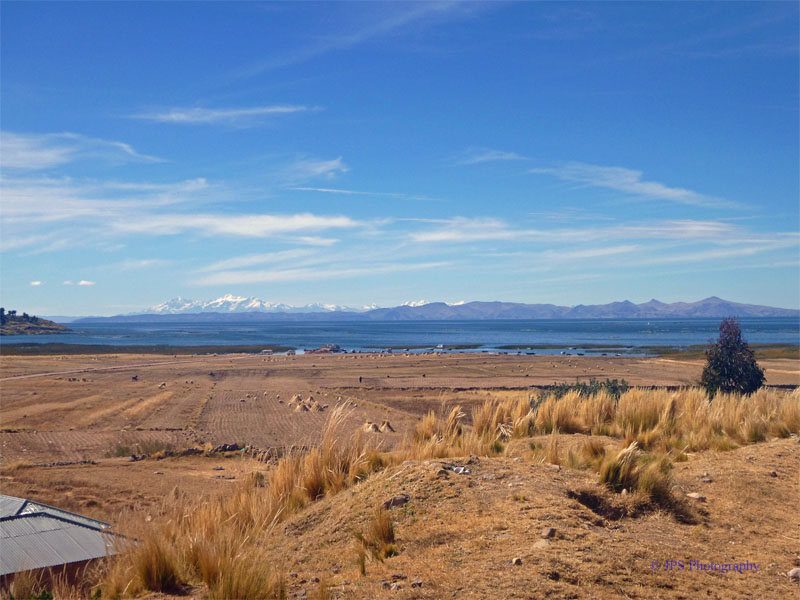
The ride to the Bolivian Border
We spy the Triumph Tiger again and this time we stop. We meet the gregarious David, an American/Mexican citizen living in Guatamala. After a quick chat we discover we are both heading for the Bolivian border at Copacabana so travel together.
We cross out of Peru easily and then it is on to Bolivia.
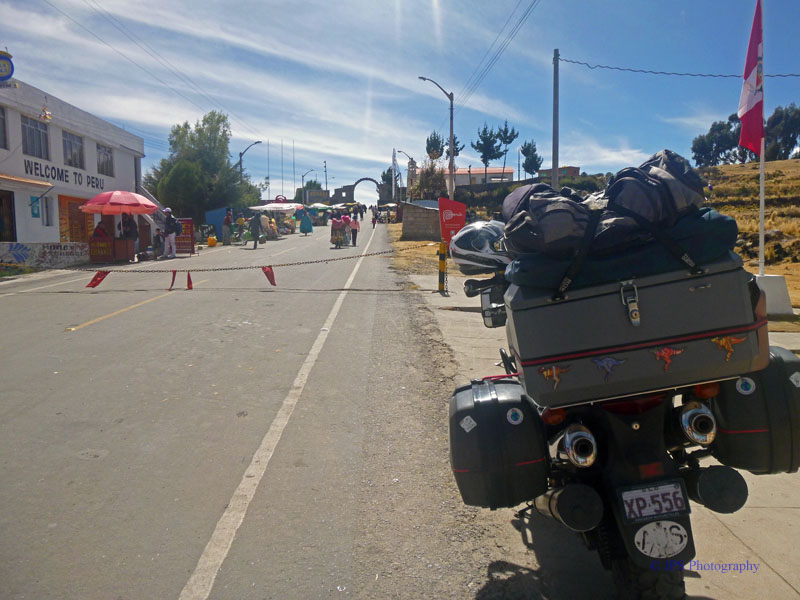
We cross out of Peru
All appears to be off to a flying start until we realise they are on lunch for an hour, What a surprise!!
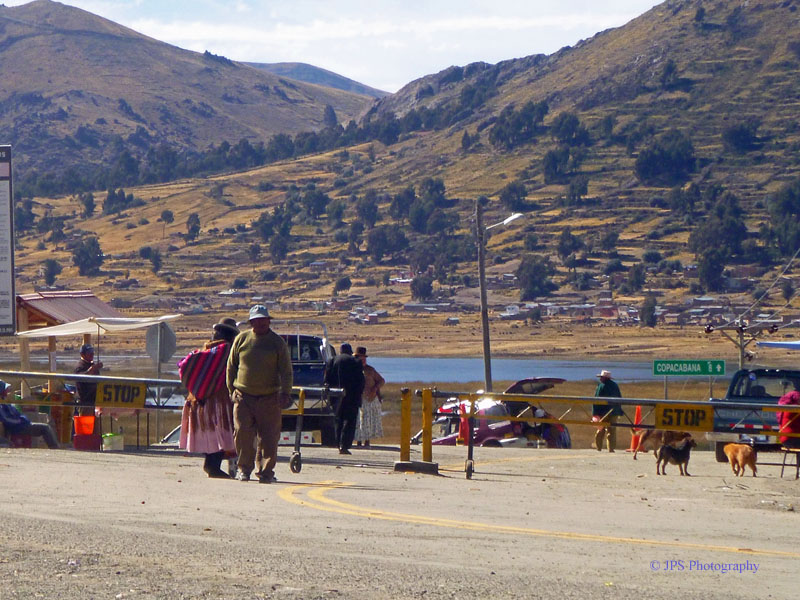
The boomgates are closed. The Bolivian side is on lunch.
We park the bikes up and have a chat, David is on a 5 month trip from Guatamala to Brazil, and has just had his wife join him in Cusco for a week to see the sights of the Sacred Valley. He is continuing on solo.
Eventually the Bolivian side is open and we are processed reasonably quickly, the boys get the temporary imports done with little fuss and no question of a bribe. Maybe having two people and a fluent Spanish speaker (ie; David) made a difference. Anyway we are off and travel the 10 kms to Copacabana where we park in the square while I try to find Hotel Utama, this is an Antje and Ingolf recommendation (travellers we met in southern Argentina).
No luck, but while I am away, Martin our Swiss van driving friend makes an appearance for the third time on this trip, I am always amazed at the way you can run into the same people so randomly. If you tried to organise it you would never do it. At this point we have an hours chat on the footpath before David decides he will join us at our accomodation and not push on to La Paz. We say good bye to Martin, find the lovely Hotel Utama and check into a room with a view over the Lake.
It is then out for a walk, and a couple of beers by the Lake, before an early dinner, a long chat, and a reasonably late evening.
Next day we spend a lazy day in Copacabana, walking along Lake Titicaca. The shores of the Lake are lined with literally 100s of swan pedalos, obviously someone thought it would be a good business venture, and everyone hopped on the bandwagon however we did not see one single one in use, we did however discuss the idea of a swan Grand Prix.
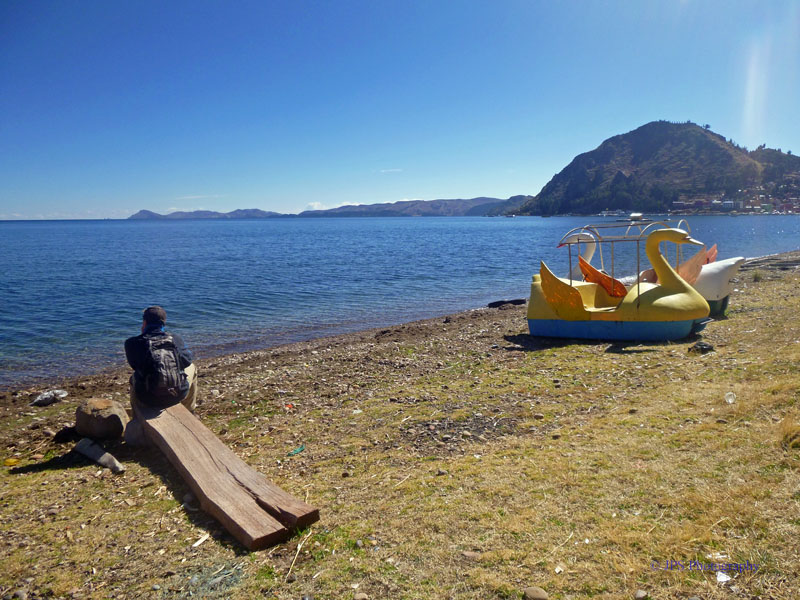
Two of the two hundred swan pedalos
Copacabana is a small town with not a lot happening, most tourists are here to visit Isla del Sol on Lake Titicaca, while many locals are here to have their cars blessed, a ritual where car and truck owners line up outside the cathedral with their vehicles decorated with flowers, ribbons and glittery top hats??? and ask the Virgen de Copacabana to protect them. While this is all well and good, perhaps a little bit of defensive driver training might actually be of more use.
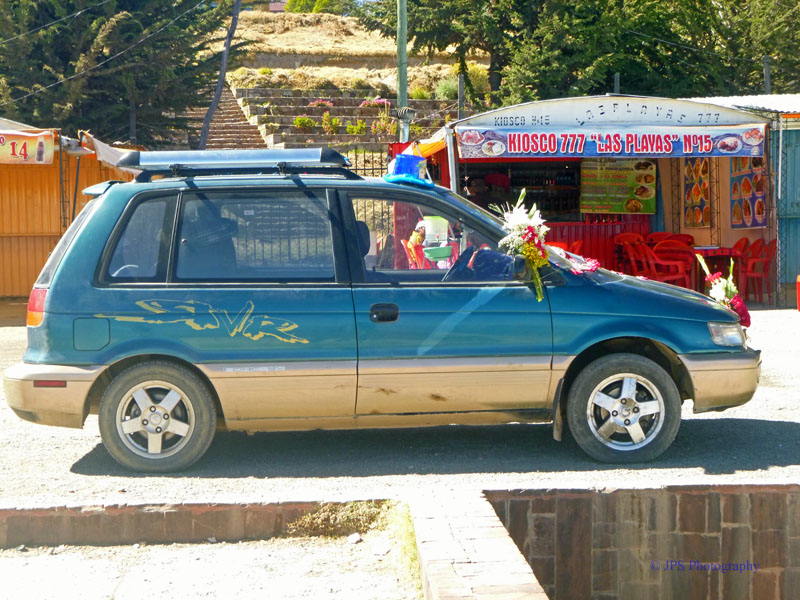
Decorated car, which has just been blessed
We decide not to take a tour out to the Isla del Sol as we did our tour from Puno on the Peru side a month or so ago, sometimes you cannot manage to do everything.
The following day, I am not feeling particularly well, I am suffering from a bad headache/mild migraine but after a slow start I am feeling a tad better so we make the break for the Lake Titicaca Ferry. Thankfully Copacabana is a small town and we manage to find our way out easily because as usual there is not one single sign to La Paz until you are actually on the road to La Paz. The ride to the ferry is a very stunning series of twists and turns over the mountains never losing sight of the highest navigable Lake in the world Lake Titicaca.
The ferry (well that is a bit of an over statement) are actually wooden punts tied together with wire and duct tape by the look of them. After a five minute wait we ride on, carefully negotiating the large cracks in the wood with views to the Lake below, then it is a 15 minute ride across the Lake where we get chatting to a lovely group of French lads who help us unload at the other end, you have to reverse off uphill, not the easiest thing on an overloaded bike. Backing the bike off is a bit of a challenge but between the 6 of us we manage not to land in the drink.
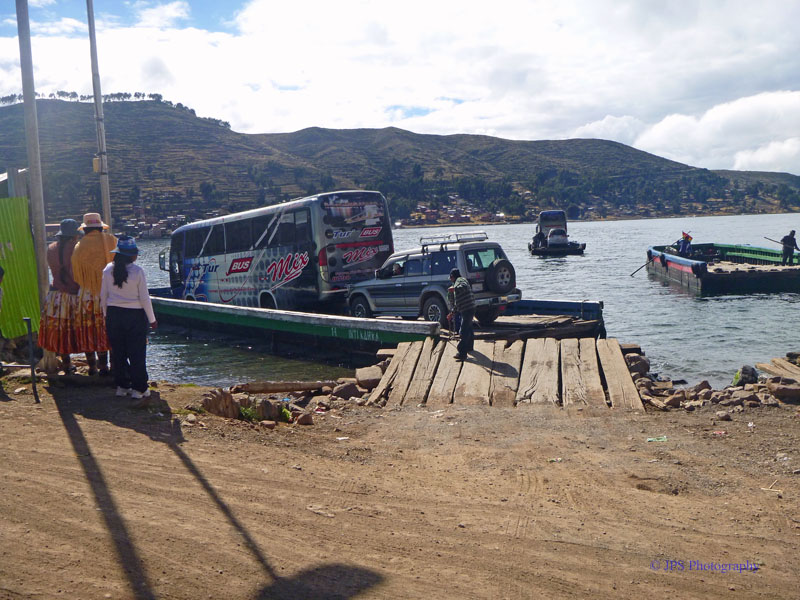
The Lake Titicaca Ferries
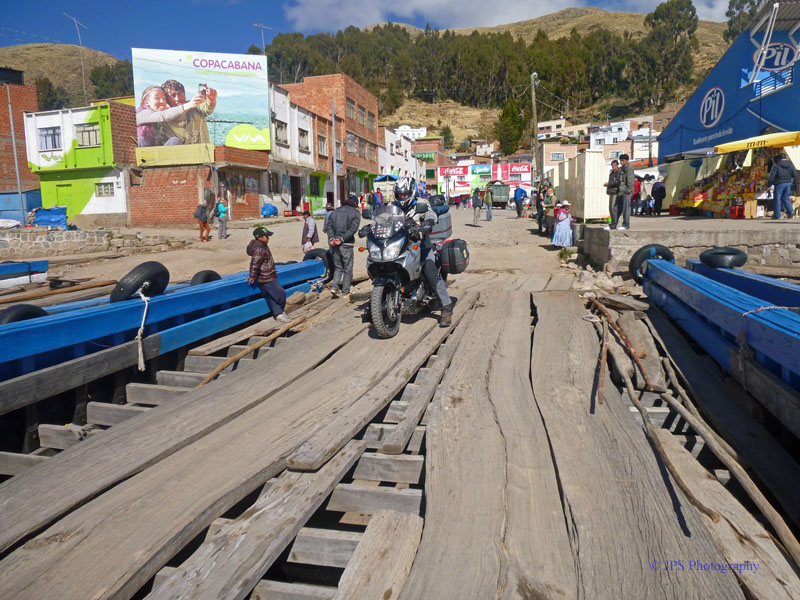
Loading the Bike onto the Ferry
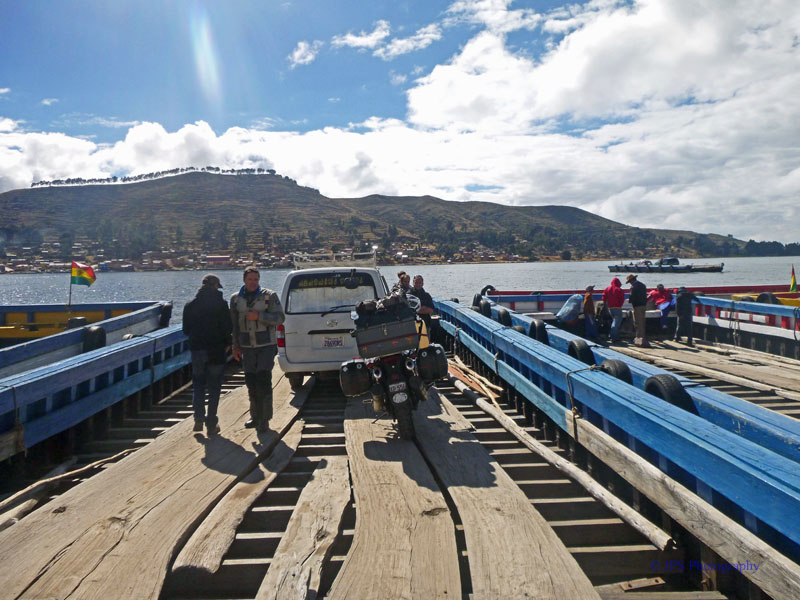
Bike on the Lake Titicaca Ferry
We continue the ride to La Paz, for a while it is really enjoyable but the closer we get to the capital the more trafficked it becomes and the slower and harder the ride. We manage to negotiate El Alto's crazy traffic without incident and then begin the hunt for the elusive Bolivian fuel, an hour later after our fourth gasoline station, still not feeling well, I lose it big time. It is not only the fact that they won't serve you, it is the fact that you line up for ten or more minutes, you get to the bowser, take the tank bag off, open the fuel tank and they absolutely and totally ignore you for another ten minutes, before very smugly saying NO or bald-facely lie to you and tell you there is no fuel.
By this time I am seething and tell Skill NOT to move the bike so we are creating a huge queue and I am having my say in Spanglish and creating a scene. I am not haggling over paying the foreigner price, I just want fuel. It didn't get us fuel but at least I had my say. The next service station also refuses us fuel but at least he does point us to a station that will sell to foreigners, so finally we can refuel after one and a half hours! Did we mention that the ridiculous fuel situation in Bolivia shits us to tears? AHHHHHHHHHHHHHHHHHHHHHHHHHHHHHHHHHH.
The ride to Oruro is actually backtracking for us and we take it fairly steady as the road is not in great condition and Skill knows I am not feeling great. It is on this road we see our first police radar at the entrance to a small town. As we are being overtaken by nearly every vehicle on the road and the police already have a number of cars pulled over we continue on without incident. However it is only ten minutes down the road that we are overtaken by the same said vehicles, obviously they have learnt their lesson.............. no ..............obviously they have paid the police off and are on their speeding way again.
About 15 kms out of Oruro we are discussing our hotel options and what we feel like for dinner when Skill looks down at the instrument panel and says to me The bike is about to conk out. What do you mean conk out? Skill says The instrument panel just died, the bike is spluttering and has lost power, the battery is dead.
Fortunately we spy a small track off to the side and take that as the bike dies. Hmmmm, what to do.
It was the same problem that Skill had when he went to the Snowy Mountains a couple of years ago with Dave Longy, the problem that we had TWO electrical guys look at before we left on the trip and was deemed to be within specifications and satisfactory.
Anyway we are now stuck on the roadside in a not so desirable part of Bolivia, Oruro is not the most inspiring place in Bolivia, in fact it would have to rate up there with the worst place we have been in Bolivia. Unfortunately we find out that Bolivians are very reticent to stop to help anyone broken down and after nearly 45 minutes we finally get a small ute (pick up) to stop, only because in sheer desperation we put ourselves on the road in front of him. After a quick chat, much measuring and consternation it is pretty obvious the bike is too heavy for us to lift onto the pick-up and is not going to fit in the small tray anyway. Skill manages to ask him to phone someone who can help us. After a few minutes he has phoned a tow/hoist truck and told us it would be an hour (all in Spanish, so I guess our Spanish is getting slightly better). This lovely man wishes us luck and continues on his way. Unfortunately the sun has just dipped below the horizon and at over 4000m altitude in winter it is already very cold and will be pitch black and much colder by the time the rescue truck arrives in an hour.
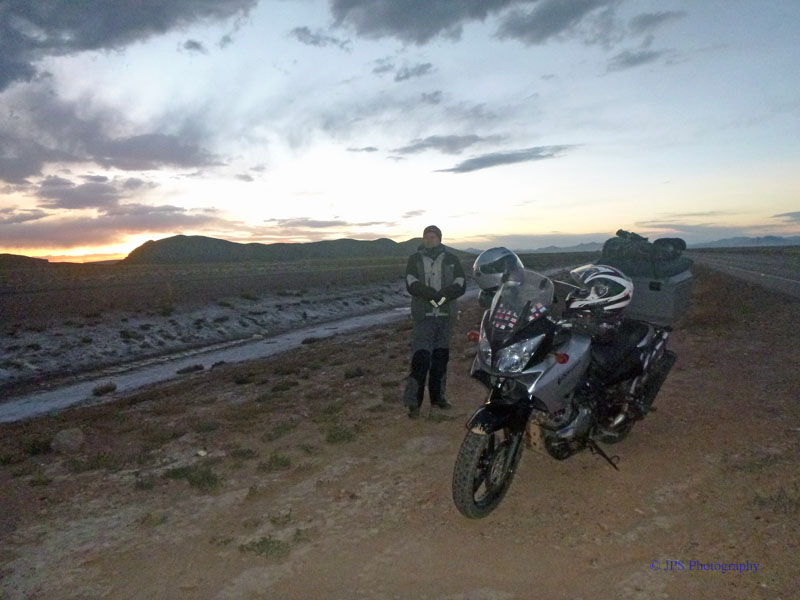
Broken down on the Oruro La Paz road
We get out our winter woollies, rain gear and headlights and stand around to wait it out. Well an hour and a half later it is now pitch black with occasional light rain/mist with temps around or below freezing, every time we see a truck approaching we illuminate the bike with our headlights but to no avail. Interestingly in the hours we have been standing by the road side no one else stops, we must really look like misfits. After an hour and a half, we have given up hope of seeing our rescue truck and are about to resort to putting up the tent on a rocky 30 degree slope a few metres from this quite busy highway.
We discuss the fact that we haven't eaten since breakfast (skipped lunch), are both feeling quite dehydrated and we barely have half a litre of water remaining, so we can't cook our emergency pasta or noodles, can't even make a hot cuppa. It would have to be about the only day of the whole trip we haven't been carrying our usual mandatory 2 litres of water with us. Guess that means no breakfast either. Bugger!
We were still contemplating our circumstances, when out of the darkness our truck appears, it looked like an angelic apparition to me. The two guys jump out and set to work.
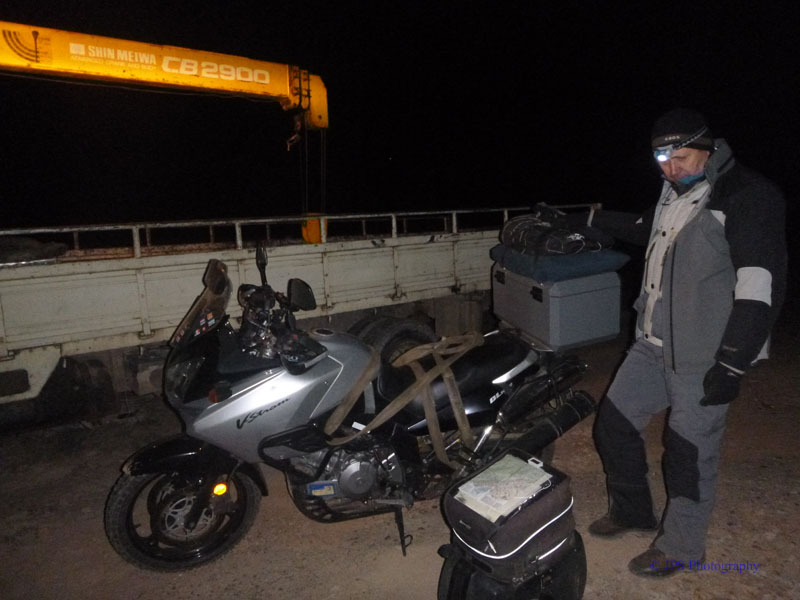
The bike ready to be hoisted onto the truck
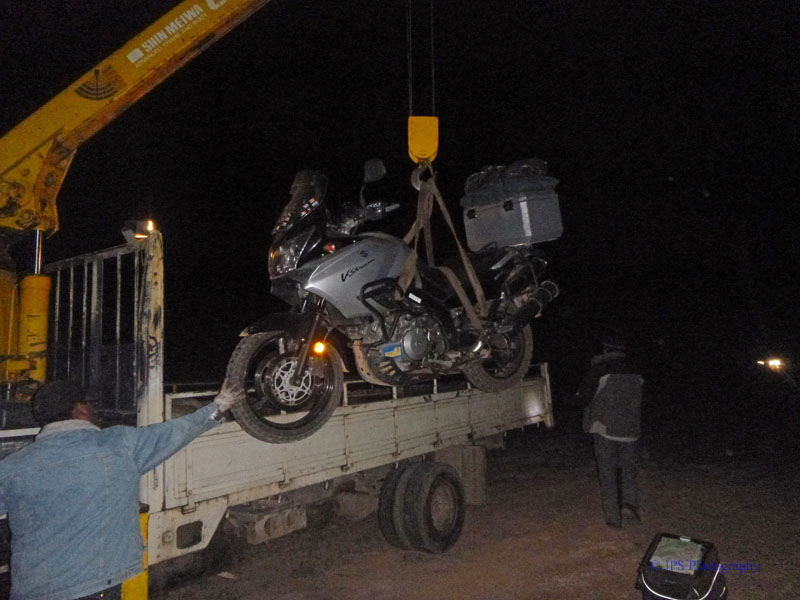
The bike is hoisted onto the truck
It takes a long while to organise the harness to hoist the bike up in the dark and cold, but this is eventually accomplished. We then load our gear and ourselves into the truck and drive to the hotel where we stayed last time we were in Oruro, thank goodness we knew of a hotel with parking. I unload our gear, check into the hotel and lug some of the stuff upstairs to the top floor while Skill and the guys unload the bike in the main square of Oruro to the amazement of the locals. We were charged gringo prices for the rescue service but to be honest I would have paid them triple.
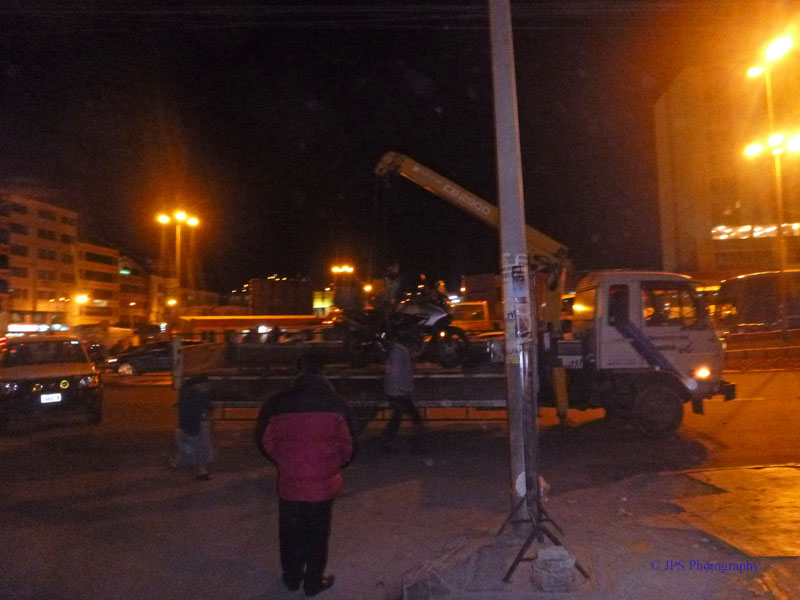
The bike is unloaded
We manage to get only a barely tepid shower (some days are just not meant to be easy), I am still not feeling that well, and am absolutely exhausted, dehydrated, and slightly nauseous, I fall into bed thanking my lucky stars I am in a warm hotel and not on a rock strewn roadside in my tent. Skill bless his cotton socks, phones Cory then hunts down some street food chicken & chips, beer, lemonade and water. It has been quite a day.
The following day I don't get out of bed until after midday, although I am a bit groggy I am feeling so much better. Skill has been busy getting the battery charged, emailing contacts and organising a rendezvous point with Cory and Paola who will be on their way back to Cochabamba from La Paz tomorrow and have have kindly offered to pick up the bike.
As our close friend Kath Finn once said to us You two were whacked in the arse by a rainbow. It probably didn't feel like it last night by the road side but what are the chances that Cory and Paolo were in La Paz and were coming home in the next day or two. Cory is probably one of the few people in Bolivia who has a vehicle set up for carrying bikes, complete with ramp and tie downs.
We arrange to meet the Rowdens at 9.30 am at Caracolla, 30 minutes out of Oruro on the road we came in on (or didn't come in on) the night before last. Riding on freshly recharged battery power alone with the headlights disconnected, we hold our breath as we ride the 35km out of Oruro. Fortunately we make it. It is so nice to see these guys again. Friendly, familiar faces go a long way to making insurmountable problems seem small. It takes a fair bit of reorganisation to load the bike and reload all the gear. We put Cory's new tailgate and loading ramp to the ultimate test, all goes well except for the undersized wire cables on the tailgate which snap under the immense weight. Oops, sorry Cory. The pick-up is really loaded up by the time we pack all our gear and repack their gear.
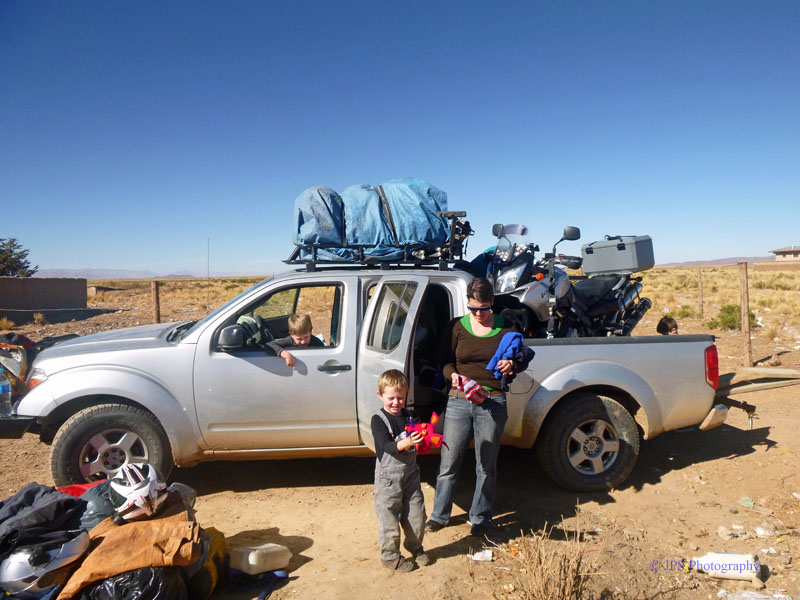
Loading the bike into the Rowden's ute.
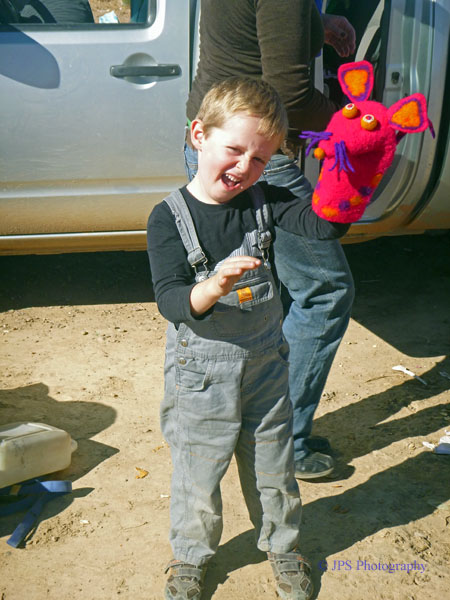
Isaac and friend help out
After some discussion we decide we should take a bus to Cochabamba as no room for us in the ute (pick-up). We farewell the Rowdens and the bike and try our hand at catching a bus. We are told buses stop here, but none do in the next hour, so we try to hail one from the road side. No luck with the first 4 or 5 just ignoring us. Seems we are not good with public transport, but eventually a coach stops on the roadside. The attendant confirms they are indeed going to Cochabamba and welcomes us aboard and explains something in a volley of Spanish. We understand none of it but soon find that there is actually only one seat available but one of us can sit on a little stool at the back, beside the toilet. Oh well it wasn't that bad, compared to a certain Moroccan bus ride complete with goat and chickens several years ago, it was sheer luxury.
About 2 hours later, half way to Cochabamaba, we are both beckoned to some recently vacated very comfortable seats near the front. You cannot complain considering it cost us $5.00 each for a 4 hour journey. As luck would have it, the driver was a really good one, not executing any of the usual dangerous stunt manoeuvres that Bolivian truck and bus drivers are famous for. He was a really safe driver. We arrive in Cochabamba and manage to hail a car-wreck masquerading as a taxi and arrive safely on Cory, Paola, Hugo, Liam and Isaac's doorstep AGAIN. The generosity of these people knows no bounds.
Between us all we manage to unload the ute (pick up), we get ourselves organised and then join the family for dinner, drinks and a lonnnnnnnnnnnnnnng chat. Once again we fall into bed exhausted.
The following day, Skill diagnoses the problem being the stator (ie; part of the alternator tests indicated it was open circuit with zero voltage being produced you can tell Skill wrote that). Skill then removes the engine case complete with stuffed stator assembly. It is then off to Cory's auto-electrician in the Cancha (walled Market Area). On first impression, the electrical shop doesn't inspire confidence wedged between junk shops with fruit sellers lining the street outside, the shop is a roller-door wide and about the same depth with one work bench about the size of a kitchen table and junk stacked everywhere. Cory discusses the problem with the electrician and apparently Skill didn't understand a word of the technical discussion in Spanish. The electrician uses his meters to check the stator and comes to the same conclusion as Skill the stator needs repair/rewiring and then immediately points to at least one of the burnt through wires. Yes he can rewind the stator, but it will take a few days. Cory assures us he is very good, so we agree the price and leave the stator with him.
As it is now Thursday and the stator won't be ready until Tuesday, we try and make ourselves useful around the house and in the bike workshop, I am not sure how successful we are but at least we are doing something. Skill does the mowing and strimming (whipper-snipping) and helps with some oil changes, tyre and wheel bearing changes on some of Cory's bikes.
On Sunday morning Paola and I venture out to the Cancha to do the monthly shop. For Paola it is hard work but I have a ball, it is such an eye opener and sure beats a day at The Plaza - our sanitised shopping mall at home. We buy heaps of fresh fruit and veges, the most amazing variety of lentils, quinoa, and rice. Then it is off to get some materials, plates and bowls, some new legins before we buy a new stool and lastly 10 kgs of potatoes. Exhausted by our shopping and lugging expedition we opt for a sugary black nescafe in the bowels of the cancha. For some reason, it is a pinch me, I can't believe I am here moment. The hardest part of our expedition is driving home, the streets around the cancha are packed with people, animals vendors, buses, taxis and traffic, to be honest I don't know how Paola negotiated it.
On Tuesday morning Skill and Cory are off on a round of jobs including picking up our repaired stator, parts for Cory's motorcycles, much stronger wire to repair Cory's tailgate wire that our bike broke and also the 2 ducklings that are to spend the school holidays at the Rowden household.
The last week passes in a blurr, once again we enjoy being in a family environment, however we are very aware that time is ticking away on our visa, we only have 19 days left. Once we have the newly rewound stator in our hot little hands, Skill reinstalls it and we hold our breathe, everything seems to go back together well and the bike is again charging as it should and all electrical readings are within specifications.
The following day we decide to take the bike for a test run, we are invited to Nathan and Kate Spies for Lunch (good friends of Cory and Paolas and our Lake friends from our last trip to Cochabamba) we ride the bike over to their place, enjoy a lovely afternoon with this great family before we say goodbye and take the bike for a bit more of a run. Everything seems to be working as it should. Later that afternoon we do a big pack up and get ourselves organised to leave next morning.
We don't get away early (so what's new), Cory helps us refuel by jerry can and we fill our trusty extra bottle at their local gasoline station, it is then more sad goodbyes and finally we can leave this poor family in peace. We have to say it, if it were not for their kindness to virtual strangers, we would probably still be scratching our heads wondering what to do. Once again they welcomed us into their home and Cory's knowledge of local motorcycle mechanics and electricians was amazing, and we just could not have done it without his help with translations. We cannot thank them enough. For more information about Cory and Paola's Bolivian motorcycle touring and hire business check out www.boliviabound.net
As we get away late and we take it easy on the road (which we are riding/driving for the fourth time) we arrive in Oruro around 2.30pm. We decide it is too late to push on to Potosi so we go back to the same hotel for the 3rd time. Once again we unpack, lug everything up to the top floor and just about die of breathlessness. Skill spends an hour going over the bike making sure it is all still ok and then begins the hunt for fuel, he walks to a couple of gasoline stations where he is again refused fuel. Feeling slightly fed up, he opts for a shower, beer, chicken and chips, with a scotch chaser. We wonder what tomorrow will bring.
Well tomorrow brings the great Bolivian hunt for fuel AGAIN, we have to try five service stations before we find one that will fill the bike and our bottle even at the foreigner price. Finally we can set off and enjoy the ride to Potosi and even manage to find another service station to refuel our bottle. Once in Potosi we get lost again, this is the 3rd time we have ridden through this city with no signs and the 3rd time we have ended up lost, it's just a maze. We end up on what we believe is one of the main roads out of town which deteriorates into a very steep single-lane rock strewn dirt 4WD track running along side a new under-construction concrete road with about half a metre lip. We can see the T-intersection with the road we want to Tupiza, but with a traffic jam of cars and vans in front all stuck on this steep rock strewn track, we cannot move. I eventually move some rocks and concrete to build a ramp and Skill artfully jumps the bike up onto the concrete road and we ride past the vehicles trying to free themselves, yeah!! So this is apparently one of the main roads through Potosi! We are finally on the highway out of town but not before dodging a few on-coming trucks doing crazy overtaking manoeuvrers. Life is never dull in Bolivia.
By this time it is quite late but we are happy to push on to Tupiza, it is a beautiful ride and thankfully we manage to dodge another police radar, luckily there was a speeding taxi in front of us and we also find a service station that will sell us some fuel! Amazing!
We arrive in Tupiza just on dark, after nine hours on the bike, find the Hotel Mitru as we know it has easy parking. We are unpacked, showered and out to dinner by 7.00pm. However after waiting an hour and a half for a pizza, we cut our losses, leave and go to another establishment. Bed was very welcome that night.
Today was our last day in Bolivia, we used up as many bolivianos as we could and changed the rest to US dollars, it was then a lovely 90 km ride to the border. For some reason it was a remarkably easy border crossing this time, the Argentinian Aduana guys were so helpful. One young man spoke great English and was a Wallabies Rugby fan. He helped smooth our way and did a very cursory glance over the bike. We had been warned that coming from Boliva they sometimes take everything off to check for drugs. However once he discovered our left over pizza in the topbox and I had offered him some, (he declined and explained that they had an asado on the go at the back of the Aduana offices you got to love Argentina) he wasn't that interested in checking anything else.
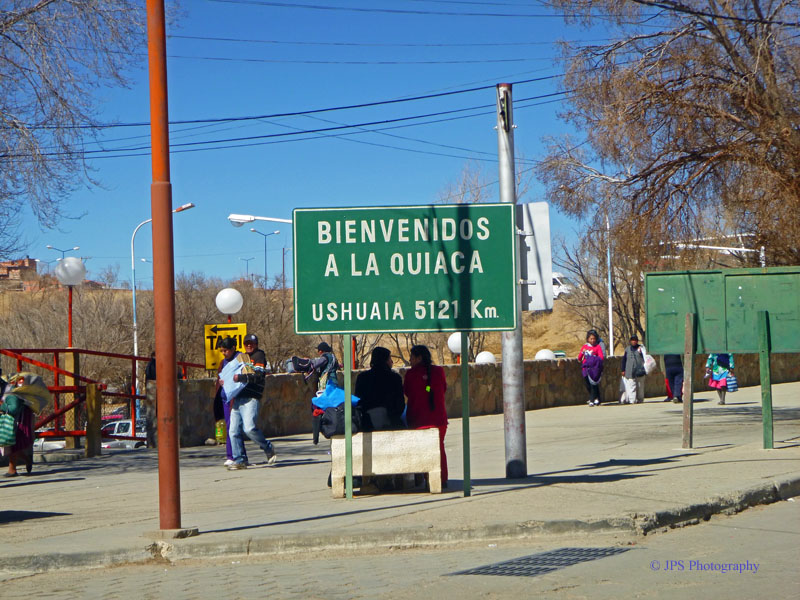
We cross back into Argentina and look it's only 5121 km back to Ushuaia!
As we are quite early we refuel (hooray we can easily buy fuel again in Argentina, but you do have to queue for it!) and decide to push on to Purmamarka, it is an absolutely beautiful 250 km ride through the most stunning mountainous countryside, we stop roadside near this Gaucho Gil roadside shrine for our leftover pizza lunch,
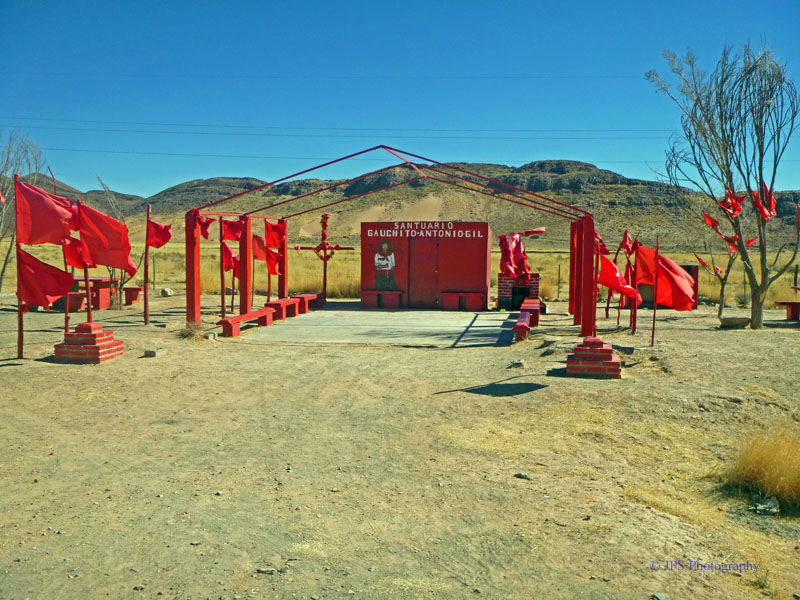
Gaucho Gil (See footnote)
before reaching Purmamarka where we find the town packed and accommodation prices double what we paid last time we were here a couple of months ago. Apparently it is Argentinian school holidays and there is a festival of some sort in progress. We decide to backtrack the 20 kms to Tilcara where we eventually find the lovely Waira hostel and camp ground. It is dinner, bed and a deep wonderful 12 hour sleep.
While we have loved Bolivia, it's natural beauty, it's sites and people, and we treasure the new friends we have made here, the fuel saga is really starting to become a major headache and pain-in-the-a***, at least it is for us.
When we started our tour around Bolivia over 3 months ago we had the occasional service station refuse to fill our five litre bottle but as time has progressed more and more service stations are refusing to fill the five litre bottle and trying to get the bike filled is a nightmare even at the foreigner price, there is no negotiation, it is just a straight out NO, it doesn't seem to matter how much money you offer them. On average we will be refused 3 to 4 times before we will find a service station that will serve us fuel. And while you can sometimes pay off a hapless taxi driver, or fellow motorist or find black market fuel, it really has become a painful exercise, adding at least an extra hour and a half or more to the daily journey, not to mention the niggling worry of running out of fuel.
We were hoping to leave Bolivia via Tarija but decided to cut our losses and leave by the shortest route, Tupiza. It is a shame that Bolivia government has made such a mountain out of a molehill. Even the blockades are not as frustrating as the fuel situation. It borders on the ridiculous. There is just no consistency of rules or their implementation.
In fact the last few overlanders in vehicles we have met have bought black market fake Bolivian number plates just to get around the fuel problem.
We really hope that the fuel issue for foreign, independent travellers gets sorted out as it is the one thing that seriously detracts from adventure travel in this amazingly beautiful country. Other than the fuel issue, Bolivia is really worth the effort. You really HAVE to see this spectacular country
Cheers,
John and Lan
Footnote:
All through Argentina, you will see red shrines of all shapes and sizes or red flags on the roadsides. They are everywhere. These are affectionate shrines to Gaucho Gil. Apparently Gaucho Gil is not an official saint in the church, he is a pseudo saint who is much revered throughout the country. There are many mysteries surrounding this man, fact and fiction have become blurred, however, it is known his name was Antonio Mamerto Gil Nuñez, he was born in the 1840's and died on January 8, 1878.
Apparently he was a deserter from the Argentine military who evaded capture for many years. During that time, he became the "Robin Hood" of Argentina, robbing from the rich and giving to the poor.
When he was eventually captured and sentenced to death, he was strung up from a tree. As the executioner was preparing to behead him, Gaucho's final words were "Don't kill me - my pardon is coming. If you do kill me, your son will be stricken with a deadly illness, and the only way to save him will be to give my body a proper burial."
The executioner obviously proceeded with his task, but when he arrived home he discovered that his son was dying. He returned to the site of the execution and buried Gaucho's body. His son was miraculously cured and so a legend was born.
Now, the superstitious Argentinians have built shrines throughout the country to celebrate the memory of Gaucho Gil. It is also where they bring offerings in the hope that their prayers will be answered.
